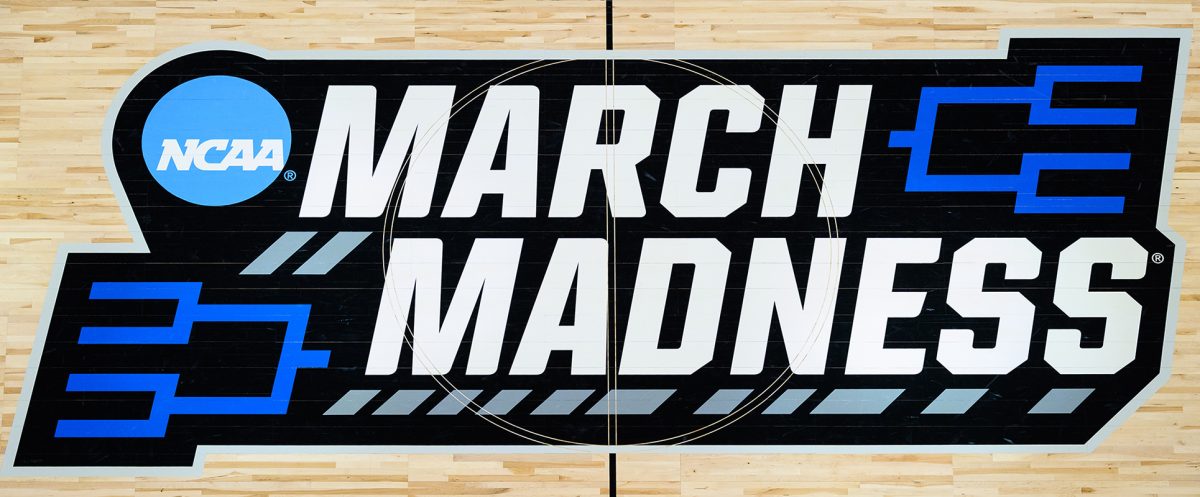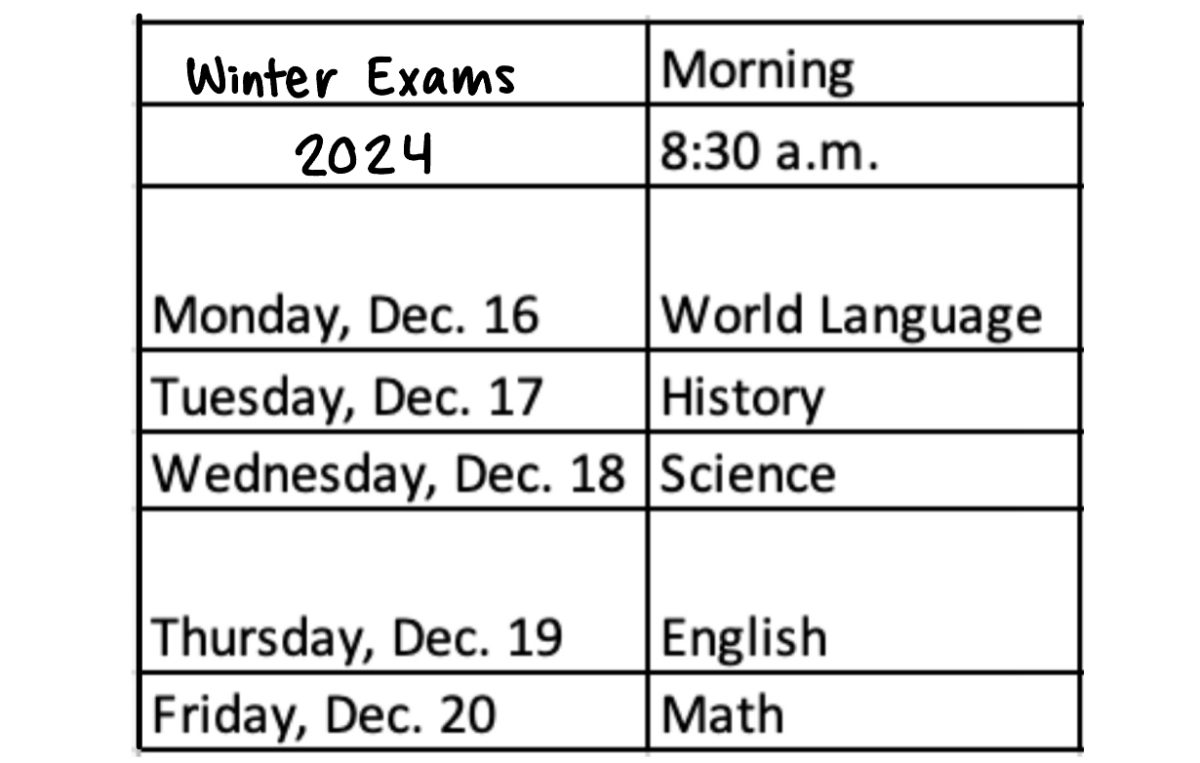For Seven Hills students, exam season is the most stressful time of the year. A significant part of your semester grade is dependent on a two-hour test, and you are expected to remember everything you have learned from August to December. Without proper preparation, exam week can lead to immense stress and anxiety about cramming all of this information into just one night. To relieve some of this stress, I interviewed each of my teachers to get faculty perspective and advice from each department on these exams. In this article, you will hear directly from the Seven Hills faculty to learn their top advice on preparing and doing well this exam season.
World Language
This season’s first exam is World Language. While there are differing views on this department’s test, most students would say language exams are of medium difficulty: harder than English exams but easier than math, science, or history. Preparation for this exam can include simple memorization of vocabulary or grammar concepts, but some parts are much harder to prepare for, such as listening and speaking portions. I interviewed Teresa Bardon, the World Language Department Chair, who teaches various Spanish courses at Seven Hills.
For vocabulary words, Bardon said, “I recommend studying with intention. You should study small chunks consistently, and you can use resources like Chat GPT to test yourself with fill-in-the-blank questions.” Additionally, many students use flashcard apps, such as Quizlet, to memorize vocabulary words from different units. For the speaking portion, a more intimidating part of the exam, Bardon recommends practicing at home first, using prompts given by your teacher. She said that “the teachers are more than willing to help all the time,” and you can gain a lot from recording yourself speaking at home first. For the listening portion, Bardon said, “It all comes back to the vocabulary.” The other concepts will become easier if you can develop a solid foundational knowledge of the vocabulary words. Bardon’s tips for the listening section are to pre-read the questions, answer the odd-numbered questions first, and then go back and answer the even numbers during the second listen. For the exam day, Bardon listed three points of advice for students:
- Eat a good breakfast before the exam.
- Do not try to study at the last minute.
- Do not discuss the test with other students, as it will cause you to second-guess yourself.
If you stay focused and adequately prepare using Bardon’s tips, you will increase your chances of succeeding on this year’s World Language exam.
History
The following day the exam is given by the History Department. History exams are also generally perceived to be of “medium-level” difficulty, as the main studying methods revolve around memorizing historical events. I interviewed my AP U.S. History teacher, Beth Driehaus, for this subject. Driehaus said, “My advice is to spend some time thinking about the big ideas from each class.” While different periods of history can often seem unrelated, you can better understand changes and continuities over time through this studying method. By connecting different historical events into groups of overarching themes, you will have an easier time comprehending the immense amount of information you are expected to know for the exam.
For review materials, Driehaus recommends using your notes, textbook, and AP review guides or videos if your exam is for an AP class. Many upperclassmen recommend Heimler’s History on YouTube, who makes short review videos for every topic in both AP World and APUSH. While these videos can be helpful, it is also important to supplement them with your notes and textbook readings to gain a more thorough understanding of the content.
When asked how far in advance people should begin studying for this department’s exam, Driehaus said, “I think you should spend 30 to 45 minutes every day for a week.” However, everyone’s study strategies are different, so you may find more success studying for longer time blocks closer to the exam date. On exam day, Driehaus said, “I think that on your drive to school, you should listen to classical music; It’s a palate cleanser.” She believes listening to popular songs in the car will get them stuck in your head and disrupt your ability to concentrate during the test. If you listen to these exam tips, you will have an easier time and earn a better grade on this year’s History exam.
Science
The Wednesday exam is given by the Science Department. It is more challenging to provide specific, general advice for this subject because the difficulty and content of these exams vary depending on the course. For example, my Honors Biology midterm was one of the hardest of my freshmen year, but my sophomore Honors Chemistry midterm was a breeze. Despite the differences in each test depending on the specific course, I decided to interview my AP Biology teacher, Bryce Carlson.
Carlson said, “My first tip would be to speak with upperclassmen who have been through that course before or who have multiple years of studying and preparation for exams in that subject.” He believes that even though teachers know what will be on the test, it has been many years since they had to go through the experience of studying for an exam, and students would obtain better advice from their peers who have recently passed through the same class.
When asked about study materials, Carlson said, “I would encourage students to try to make sense of their subject by synthesizing information across multiple resources; every resource they find is going to approach a subject from a slightly different perspective, and true understanding will be formed when they make sense of those different perspectives together.” He believes that students should begin studying as early as possible and engage with the material as they learn it to decrease the time spent re-learning the content before the exam.
Lastly, Carlson said, “No matter how far ahead or behind you are in your studying, it is essential that you get a full night of sleep the night before and the days leading up to the exam. Your ability to think through the complex questions that connect information across units is dependent on you being able to focus and bring all of your attention to that novel problem.” He believes that cramming can sometimes work if the exam is primarily content recall, but AP Biology and various other subjects require you to think in complex ways and connect ideas from across units, which you will not be able to do without proper rest the night before. So, by speaking to upperclassmen, using many resources, and getting a good night’s sleep the night before, you will increase your chances of doing well on your science exam, no matter the subject.
English
Thursday of exam week is reserved for the English department. However, this “exam” is usually just an essay you are allowed to pre-write and submit on the exam day. Because of this, I did not interview a specific teacher from this department, as this test does not require any extra advice that would be different from a typical essay. Just do your best and produce the best writing you can!
However, the junior class does something different for their English midterm: a writing screen. This is a timed essay for teachers to ensure the junior class is familiar with the necessary grammar and writing concepts that they need to know for college and beyond. If you do not pass this screening, the Seven Hills teachers will work with you to ensure that you learn these essential skills. However, if you want to do extra preparation for this exam, I recommend refreshing your memory on standard grammar and spelling mistakes, as you are not allowed to use Grammarly on the test. This is considered to be the easiest exam, so I recommend finishing your English work and prioritizing studying for the next and perhaps the most daunting exam: Math.
Math
The final exam of this season is given by the Math Department. Many students say that this is the most challenging exam, so the fact that it is at the end of the week makes it even more difficult, as everyone is tired and burnt out from the past 4 days. I decided to interview Sarah Mullan from the Math Department, who teaches many different math courses at Seven Hills. She suggests that studying should be broken down into a multi-step process. Mullan said, “I think the first step should be organizing your materials, looking through old tests, and writing notes about things you don’t remember.” Once you find these materials, you can redo old tests, quizzes, homework, and textbook problems to ensure that you get practice from every unit covered on the exam.
Next, Mullan said, “I think you should try to simulate the exam as much as possible. So, without any notes or internet use, try doing new practice problems similar to ones you’ve done before.” She recommends beginning your preparation about two weeks before the exam, but the first week can be spent organizing your materials. Mullan said, “By doing this, once you get into the more stressful week of exams, you’re already organized and ready to go with the materials you need to study and topics you want to get more practice on.”
When asked to give advice for exam day, Mullan said, “Remind yourself that you know how to do this, have faith in yourself, and think about similar problems you’ve done before that could help you be successful on this test.” If you get stuck on a problem, Mullan recommends skipping it and returning later so you don’t lose time on another question that may be worth a similar amount of points. By organizing your materials, going over old assessments, and staying focused during the test, you will increase your chances of succeeding on this year’s math exam.
Conclusion
Congratulations! After getting through these five days, you will have survived the 2024 midterm exam week! Walking out of the building on Friday at 10 AM is the best feeling in the world; you will have completed this immensely stressful week and will now be rewarded with two weeks of winter break. As a junior, my biggest tip is to remember that you are not alone during exam week; the entire Upper School is going through this exact same process. So, don’t be afraid to talk to other students! Ask them how they are preparing, or ask upperclassmen for advice on a specific class as they have already been through it. Just remember that the week will be over before you know it. Do your best, stay motivated, and tell yourself that what you put into your preparation is what you’ll get from your exam and final semester grade. Good luck!























